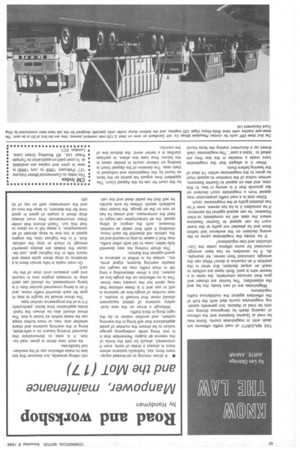THE MAJORITY of road traffic offences are dealt with in
Page 44

If you've noticed an error in this article please click here to report it so we can fix it.
magistrates Courts. Some may be tried at Quarter Sessions and the offence of causing death by dangerous driving can only be tried at Assizes, but generally speaking magistrates courts deal with the bulk of the offenders against the multifarious traffic regulations.
Magistrates are of two kinds; the lay and the stipendiary. The former are chosen and give their services voluntarily, the latter is a lawyer who is paid. Both types are unlikely to reach an unjust decision. But what is the position if an injustice is done? What can the wrongly convicted fleet owner, for example, do, if he considers he has been wrongly convicted for some offence under the Con struction and Use regulations? , If he thinks the magistrates came to the wrong decision on the evidence laid before them and he pleaded not guilty at the lower court he can appeal to Quarter Sessions where the case will be completely re-tried. However, he can appeal against his sentence, if he considers it to be too severe, even if he has pleaded guilty at the magistrates' court.
Either side in a road traffic prosecution may appeal from a magistrate court decision on tie grounds that it is wrong in law. In this case, and also on appeal to Quarter Sessions, written notice of the intention to appeal must be given to the magistrates within 14 days of the hearing before them.
When it is alleged that the magistrates have made a mistake in the law they are asked to "state a case". The magistrates' clerk draws up a document stating the facts found by the court for use by the Appeal Court. The appellant then argues his points on the facts as found by the magistrates and indicated in their case. The decision of the Appeal Court is binding on inferior courts in similar cases in the future; thus case law alters, or perhaps clarifies is a better word, the statute law of the country.




























































































































































